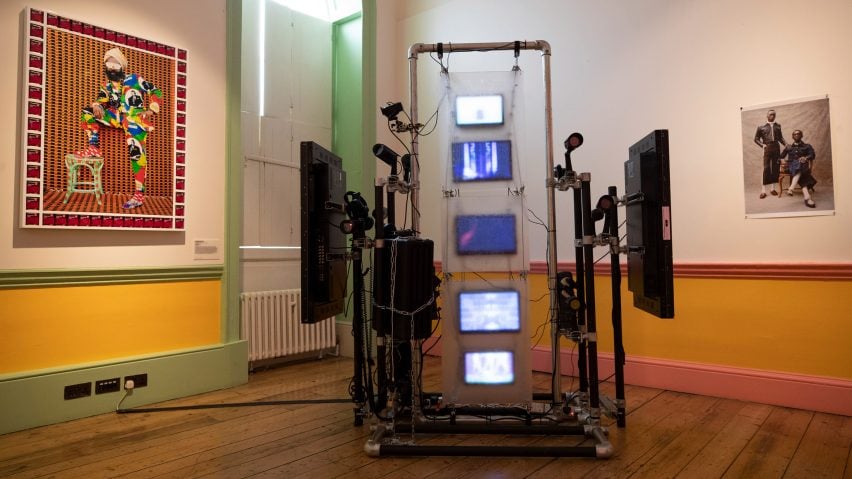Designer Yinka Ilori has used his signature colourful and graphic style to create the exhibition design for Get Up, Stand Up Now, a show celebrating half a century of black creativity in the UK.
Ilori's design sees the neoclassical rooms of Somerset House in London transformed with bold shades, as a backdrop for art, photography, design, film and fashion by black creatives.
The show is curated by artist Zac Ové, and includes pieces ranging from video work to a Notting Hill Carnival trolley.
These are accompanied by archival photographs, letters and video clips that demonstrate how makers merged the personal and the political to address the issues of their time.
Ilori – a judge of this year's Dezeen awards – is a London-based designer, although his roots are in Nigeria, and his work often draws on the colours and patterns of his African heritage.
His design for Get Up, Stand Up Now is a riot of colour and pattern. Visitors enter from the Somerset House courtyard through a vibrant multi-coloured door surround, which reflects the brightly hued flags flying outside.
Inside, bench seating is upholstered in a digitally printed cotton textile, designed in the style of wax batik fabric, and the walls are painted in bold hues.
Wall-mounted listening booths are decorated with circles in contrasting shades.
The confluence of tropical colours and vivid pattern continues along the corridor that connects the gallery rooms, in which work is separated into five key themes: Motherland, Dream to Change the World, Masquerade, Imaginary Landscapes and Mothership.
The corridor is lined with scallop-edged way-markers that indicate the entrances to each room in vivid tones. The colours in these are reflected in the paintwork of pillars, door frames and arches throughout the space.
The design creates a kaleidoscope of archways when looking from one end of the exhibition to the other.
The overlapping forms and bright colour palette echo Ilori's design for The Colour Palace, the multicoloured pavilion currently installed outside Dulwich Picture Gallery in south London.
In each exhibition room, the walls, wooden panelling, door and window frames and cornicing are picked out in contrasting tones with display cabinets decorated with repeat patterns based on circles and graphic blocks.
The show also incorporates a "temple to learning" created by Nigerian-American artist Victor Ekpuk, complete with an Afrofuturist mural.
Books about black history and culture are available for visitors to browse, while the bespoke table and chairs are designed by Ilori.
Amongst the more than 100 creatives with work on display are Turner Prize-winning artists Steve McQueen and Lubaina Himid, Scottish-born Trinidad-based painter Peter Doig, and artist Yinka Shonibare.
Alongside visual art, black creatives' contribution to the music and film scene is also represented, including work by the curator's father Horace Ové – the creator of the first feature film by a black British director, 1975's Pressure.
The intersection between creative practices is also explored. For example, Faisal Abdu'Allah works as a barber alongside his artistic practice. His gold-plated barber's chair recognises the barber's shop as a site of cultural exchange and camaraderie.
A series of films exploring topics of black identity and creativity are shown on a loop in a specially constructed screening room at the end of the exhibition and a number of talks and cultural events will take place during the run.
Get Up, Stand Up Now runs at the West Wing galleries in Somerset House until 15 September 2019.

